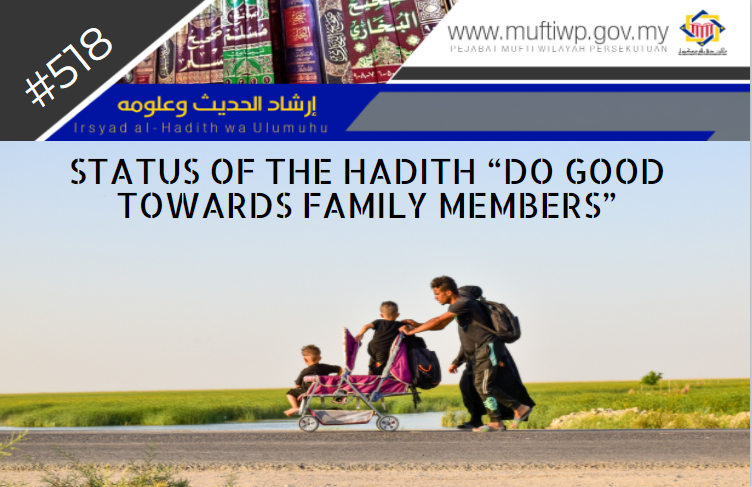Question:
“It is narrated by Aisha RA, she said: The Prophet PBUH said: ‘The best amongst you is the best towards his or her family members, and I am the best person towards my family members. When one of your friends passes away, leave him be (leave him be and do not speak about his wrongdoings)”
Salam. Does the above hadith sahih?
Brief Answer:
After some evaluation, the status of the hadith is sahih. So, Islam commands its ummah to always do good towards family members and others. The good deeds will become even magnificent if it is done within one’s capacity and does not harm oneself.
Explanation
Alhamdulillah, praise and thanks to Allah for the countless blessings He has blessed us all with. Blessings and salutations to the Prophet Muhammad PBUH, his wives, his family, companions and all those that follow his teachings to the day of judgement.
Referring to the above question, the hadith is narrated by al-Tirmidhi in his Sunan. It is narrated from Saidatina Aisha RA that the Prophet PBUH said:
خَيْرُكُمْ خَيْرُكُمْ لأَهْلِهِ وَأَنَا خَيْرُكُمْ لأَهْلِي وَإِذَا مَاتَ صَاحِبُكُمْ فَدَعُوهُ
"The best of you is the best to his wives, and I am the best of you to my wives, and when your companion dies, leave him alone." [1]
Jami’ al-Tirmidhi (3895)
This hadith is also narrated by Abu Dawud in his Sunan, in the chapter of Fi al-Nahy ‘an Sabb al-Mauta, hadith no. 4899 which matn (text) has some differences (إِذَا مَاتَ صَاحِبُكُمْ فَدَعُوهُ، وَلَا تَقَعُوا فِيهِ). [2] al-Darimi in his sunan, the chapter of Fi Husn Ma’asyirah al-Nisa’, hadith no. 2306 with difference in the matn by the phrase (وَأَنَا خَيْرُكُمْ لِأَهْلِي) [3] Ibn Hibban also narrated in his Sahih, chapter Zikr Istihbab al-Iqtida’ bi al-Mustafa SAW, hadith no. 4177. [4] In fact, this hadith is narrated by several other muhaddithin.
According to al-Tirmidhi, this hadith is hassan sahih. [5] So, it is highly encouraged to be practiced and shared. This is as what is mentioned by al-Tirmidhi in al-‘Ilal al-Saghir like,
جَمِيع مَا فِي هَذَا الْكتاب من الحَدِيث فَهُوَ مَعْمُول بِهِ وَقد أخد بِهِ بعض أهل الْعلم مَا خلا حديثين حَدِيث بن عَبَّاس أَن النَّبِي صلى الله عَلَيْهِ وَسلم جمع بَين الظّهْر وَالْعصر بِالْمَدِينَةِ وَالْمغْرب وَالْعشَاء من غير خوف وَلَا سفر وَلَا مطر وَحَدِيث النَّبِي صلى الله عَلَيْهِ وَسلم أَنه قَالَ إِذا شرب الْخمر فاجلدوه فَإِن عَاد فِي الرَّابِعَة فَاقْتُلُوهُ وَقد بَينا عِلّة الْحَدِيثين جَمِيعًا فِي الْكتاب قَالَ وَمَا ذكرنَا فِي هَذَا الْكتاب من اخْتِيَار الْفُقَهَاء
Each hadith in this book is practiced as a whole. Some scholars take these hadiths as arguments, unless two hadiths which are hadith of Ibn Abbas that the Prophet PBUH combine (jama’) Zuhr and Asr prayers in Medina, and also (jama’) Maghrib and Isha’ prayers without being in the situation of fear, travelling and raining, and the hadith “That verily the Prophet PBUH said: ‘When a person drinks liquor, cane him. If he repeats for the fourth time, kill him. We already explained the ‘illah (defect) for both these hadiths in this book. And we state in this book on the opinion of the jurists. [6]
Conclusion
The hadith is sahih. It is undeniable on the content of the hadith to call us towards doing good to our family members. Wallahu a’lam.
Resources
[1] Muhammad bin ‘Isa bin Saurah al-Tirmidhi, Sunan al-Tirmidhi, ed. Ibrahim ‘Athauwah (Mesir: Matba’ah Mustafa al-Babi al-Halabi, 1975), 5/709.
[2] Abu Daud Sulaiman bin al-Asy’at, Sunan Abi Daud, ed. Muhammad Muhy al-Din ‘Abd al-Hamid (Beirut: al-Maktabah al-‘Asriyyah, t.t), 4/275.
[3] ‘Abd Allah bin ‘Abd al-Rahman al-Darimi, Musnad al-Darimi, ed. Husain Salim Asad al-Darani (al-Mamlakah al-‘Arabiyyah al-Sa’udiyyah: Dar al-Mughni, 2000), 3/1451.
[4] Muhammad bin Hibban, Sahih Ibn Hibban bi Tartib Ibn Bilban, ed. Syu’aib al-Arna’ut (Beirut: Mu’assasah al-Risalah, 1993), 9/484.
[5] Muhammad bin ‘Isa bin Saurah al-Tirmidhi, Sunan al-Tirmidhi, ed. Ibrahim ‘Athauwah, 5/709.
[6] Muhammad bin ‘Isa bin Saurah al-Tirmidhi, al-‘Ilal al-Saghir, ed. Ahmad Muhammad Syakir (Beirut: Dar Ihya’ al-Turath al-‘Arabi, t.t), 1/736.


